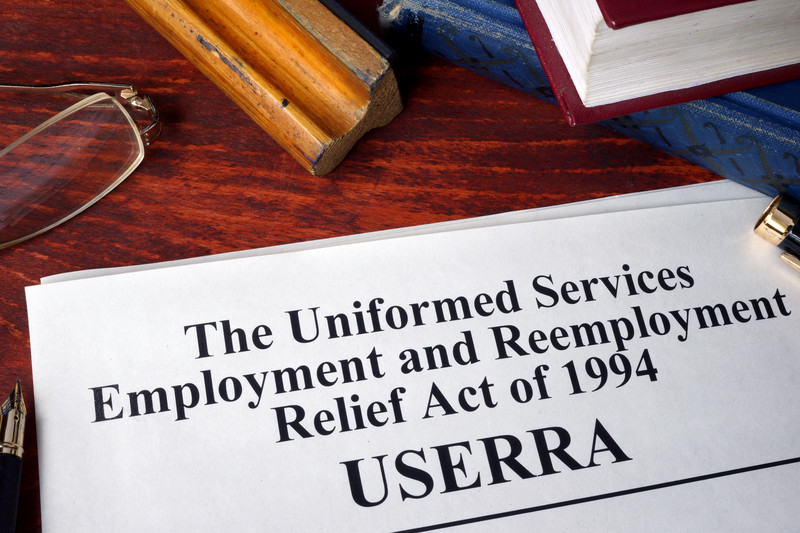- Contact Us Now: (615) 490-6020 Tap Here to Call Us
Fired From Civilian Job Due to Military Operational Requirements–What Are My Rights?

Understanding USERRA
The Uniformed Services Employment and Reemployment Rights Act of 1994 (USERRA) is a federal law designed to protect the civilian employment of active, reserve, and national guard military personnel in the United States called to active duty.1 The three major purposes of USERRA are protection against discrimination, minimize disruption by providing for prompt reemployment, and protection of one’s pre-deployment job.2 The law clarifies that it is illegal for employers to discriminate against employees because of past, present, or future military service
Enforcement
The U.S. Department of Labor, Veterans Employment and Training Service (VETS) is authorized to investigate and resolve complaints of USERRA violations.3 Eligible employees may file a complaint with VETS. If VETS investigates the complaint and is unable to resolve the issue, the case may be referred to the DOJ. The DOJ may represent the claimant at no cost. In reality, the DOJ does not litigate USERRA cases often. Employees may bypass the VETS procedures and file a civil action against an employer for violations of USERRA.
In a highly unusually provision, USERRA expressly states statutes of limitations are inapplicable in USERRA cases.4 Despite the text of that provision, other legal doctrines such as estoppel or latches may apply that will limit a potential plaintiff’s ability to successfully sue decades after a violation.
Staub v. Proctor Hospital, the only U.S. Supreme Court USERRA Case
The United States Supreme Court showed that USERRA violations are actionable in a case where a former employee, who was a member of the Army Reserve, sued for USERRA violations.5 Staub’s civilian immediate supervisor and his second supervisor were both hostile to his military obligations.6 Both supervisors made numerous comments such as Staub’s “military duty had been a strain on the department” and asked another employee to help “get rid of him”.7 Staub was later fired, and he challenged this action through the company’s grievance process. Staub then sued under USERRA, “claiming that his discharge was motivated by hostility to his obligations as a military reservist.”8 A jury found for Staub and he was awarded damages. The Seventh Circuit reversed holding the employer was entitled to judgment as a matter of law. The issue presented to the Supreme Court was whether the employer was entitled to judgment as a matter of law based on a “cat’s paw” discrimination claim.
In an 8-0 decision, the Court found for Staub and held: “if a supervisor performs an act motivated by antimilitary animus that is intended by the supervisor to cause an adverse employment action, and if that act is a proximate cause of the ultimate employment action, then the employer is liable under USERRA.”9 The Court reasoned that the employer was not entitled to judgment as a matter of law based on four reasons:
1) Both of Staub’s supervisors were acting within the scope of their employment when they took actions against Staub that lead to him being fired.
2) There was sufficient evidence in the record that the supervisors’ actions were motivated by their hostility toward Staub’s military obligations.
3) There was evidence that the supervisors’ actions were causal factors.
4) There was evidence that both supervisors had specific intent to cause Staub to be terminated.
The Supreme Court’s decision in Staub clarified the scope of USERRA protection in employment discrimination law and is still the seminal case on the issue to this day.
Conclusion
USERRA is federal law that offers protection to military members of the active, reserve, and national guard components called to active duty. The law provides protection against discrimination, provides for prompt reemployment, and protection of pre-deployment job. VETS is authorized to investigate complaints or employees may bypass that system with a civil lawsuit. If you think you have a USERRA issue, I encourage you to speak with a licensed military l attorney to understand your options
_____________________________
1 38 U.S.C. §§ 4301-4335.
2 See 38 U.S.C. §4301.
3 38 U.S.C. §4321.
4 38 U.S.C. §4327(d).
5 Staub v. Proctor Hosp., 562 U.S. 411 (2011).
6 Staub, 562 U.S. at 414.
7 Id.
8 Id. at 415.
9 Staub, 562 U.S. at 422.
















